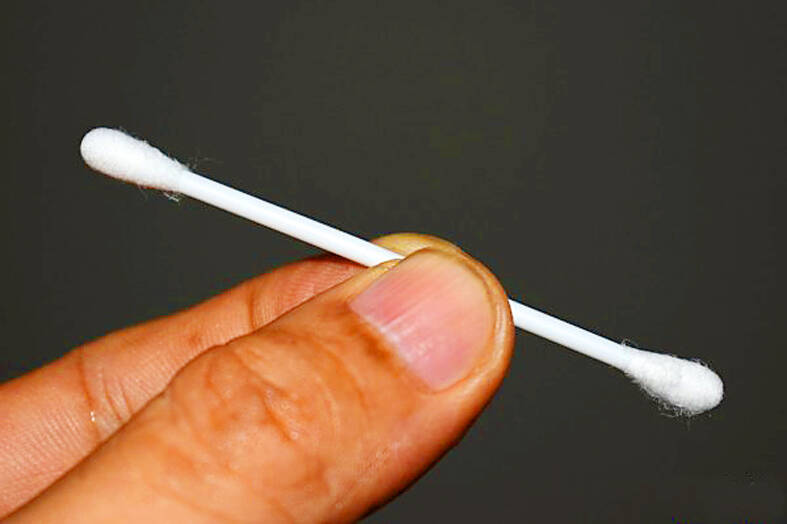The Food and Drug Administration (FDA) yesterday warned members of the public that cotton swabs can be categorized as “medical use” and “non-medical use,” and purchasing excessive amounts of medical use cotton swabs from abroad is illegal.
A woman in Tainan was recently fined for buying more than 200 medical use cotton swabs from Chinese e-commerce platform Taobao, an action that allegedly contravened the Medical Devices Act (醫療器材管理法), which stipulates that for the manufacture or import of medical devices, people must file an application to the central competent authority for registration and market approval, or else they could face up to three years imprisonment or a fine up to NT$10 million (US$326,958).
As the woman did not comply when she was summoned for questioning, she was detained, the Tainan District Prosecutors’ Office said.

Photo: Taipei Times
Regular cotton swabs used for removing makeup, cleaning or other uses are categorized as “general goods” and are not regulated by the act, FDA Medical Devices and Cosmetics Division Director Chien Chia-hung (錢嘉宏) said.
People are allowed to bring up to 200 medical use cotton swabs into Taiwan from overseas every six months, but to bring more, they need to file an application and pay import fees, or the products may be disposed of, or returned, and the person may face punishment, the act states.
If people bring in non-medical use cotton swabs from abroad, they must comply with customs regulations, and if they want to import excessive amounts, they might face customs duties, but it is not related to the Medical Devices Act, Chien said, adding that customs officers may ask for FDA assistance when they cannot identify whether a product is a medical device.
Only some types of medical devices can be sold online, and only by retailers that have required licenses, and the product name and permit number must be shown on the Web page, he said.
Asked why the woman in Tainan was fined NT$100,000, he cited prosecutors as saying that the fine was not because she violated the act, but because she refused to appear when summoned for questioning.
The case is still being investigated by prosecutors, and the court has not made a final ruling, so the details are unknown, he added.

UNILATERAL MOVES: Officials have raised concerns that Beijing could try to exert economic control over Kinmen in a key development plan next year The Civil Aviation Administration (CAA) yesterday said that China has so far failed to provide any information about a new airport expected to open next year that is less than 10km from a Taiwanese airport, raising flight safety concerns. Xiamen Xiangan International Airport is only about 3km at its closest point from the islands in Kinmen County — the scene of on-off fighting during the Cold War — and construction work can be seen and heard clearly from the Taiwan side. In a written statement sent to Reuters, the CAA said that airports close to each other need detailed advanced

Tropical Storm Fung-Wong would likely strengthen into a typhoon later today as it continues moving westward across the Pacific before heading in Taiwan’s direction next week, the Central Weather Administration (CWA) said. As of 8am, Fung-Wong was about 2,190km east-southeast of Cape Oluanpi (鵝鑾鼻), Taiwan’s southernmost point, moving westward at 25kph and possibly accelerating to 31kph, CWA data showed. The tropical storm is currently over waters east of the Philippines and still far from Taiwan, CWA forecaster Tseng Chao-cheng (曾昭誠) said, adding that it could likely strengthen into a typhoon later in the day. It is forecast to reach the South China Sea

Almost a quarter of volunteer soldiers who signed up from 2021 to last year have sought early discharge, the Legislative Yuan’s Budget Center said in a report. The report said that 12,884 of 52,674 people who volunteered in the period had sought an early exit from the military, returning NT$895.96 million (US$28.86 million) to the government. In 2021, there was a 105.34 percent rise in the volunteer recruitment rate, but the number has steadily declined since then, missing recruitment targets, the Chinese-language United Daily News said, citing the report. In 2021, only 521 volunteers dropped out of the military, the report said, citing

WEATHER Typhoon forming: CWA A tropical depression is expected to form into a typhoon as early as today, the Central Weather Administration (CWA) said yesterday, adding that the storm’s path remains uncertain. Before the weekend, it would move toward the Philippines, the agency said. Some time around Monday next week, it might reach a turning point, either veering north toward waters east of Taiwan or continuing westward across the Philippines, the CWA said. Meanwhile, the eye of Typhoon Kalmaegi was 1,310km south-southeast of Oluanpi (鵝鑾鼻), Taiwan’s southernmost point, as of 2am yesterday, it said. The storm is forecast to move through central